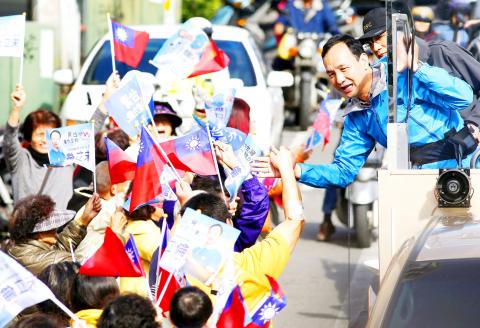Chinese Nationalist Party (KMT) presidential candidate Eric Chu (朱立倫) yesterday urged his supporters to cling to their faith and cast their party votes for the KMT, amid growing competition from other pan-blue parties.
Chu made the remarks when canvassing for votes in Changhua County yesterday morning, in response to reporters’ inquiries on how he planned to respond to growing calls for KMT supporters to give their party vote to the New Party.
“Such a practice is bound to spark huge controversy, which I believe could be avoided if everyone just supports Eric Chu,” Chu said.

Photo: Olivia Harris, Reuters
Chu also dismissed allegations made by media personality Clara Chou (周玉蔻) during a political talk show on Sunday that a senior KMT member who had served in the Cabinet was mulling launching a campaign urging pan-blue supporters to abandon Chu and vote for People First Party presidential candidate James Soong (宋楚瑜).
“I have never heard of such a plan. There are all sorts of false rumors during the final stage of an election campaign, but I believe all our supporters will vote for me,” Chu said.
There have been grave concerns that the KMT could lose chunks of the party vote to other pan-blue parties in Saturday’s legislative election, primarily due to its lackluster approval ratings and the record-high number of 18 political parties on the legislator-at-large ballot.

Photo: Chien Jung-fong, Taipei Times
To make matters worse, a number of KMT members have urged their supporters to cast their party votes for the New Party.
On Saturday, KMT Legislator Alex Tsai (蔡正元) listed on Facebook four reasons why pan-blue supporters should cast their party votes for the New Party, such as allowing another pan-blue party to form a legislative caucus to check the pan-green parties.
Last month, former premier Hau Pei-tsun (郝柏村) of the KMT also called on supporters to cast their party votes for the New Party, calling it the “legitimate KMT.”
Legislator-at-large seats are awarded to parties that garner at least 5 percent of the party votes in the election and in proportion to the number of votes each party gains.
At a separate event in Nantou County yesterday, Chu said DPP presidential candidate Tsai Ing-wen’s (蔡英文) “failure to elaborate” on her cross-strait policies has unnerved many foreign reporters and academics, as well as the “silent majority” in Taiwan.
“That is why I must urge the public to come out on Saturday and vote in favor of Eric Chu,” Chu said.

AGING: As of last month, people aged 65 or older accounted for 20.06 percent of the total population and the number of couples who got married fell by 18,685 from 2024 Taiwan has surpassed South Korea as the country least willing to have children, with an annual crude birthrate of 4.62 per 1,000 people, Ministry of the Interior data showed yesterday. The nation was previously ranked the second-lowest country in terms of total fertility rate, or the average number of children a woman has in her lifetime. However, South Korea’s fertility rate began to recover from 2023, with total fertility rate rising from 0.72 and estimated to reach 0.82 to 0.85 by last year, and the crude birthrate projected at 6.7 per 1,000 people. Japan’s crude birthrate was projected to fall below six,

Conflict with Taiwan could leave China with “massive economic disruption, catastrophic military losses, significant social unrest, and devastating sanctions,” a US think tank said in a report released on Monday. The German Marshall Fund released a report titled If China Attacks Taiwan: The Consequences for China of “Minor Conflict” and “Major War” Scenarios. The report details the “massive” economic, military, social and international costs to China in the event of a minor conflict or major war with Taiwan, estimating that the Chinese People’s Liberation Army (PLA) could sustain losses of more than half of its active-duty ground forces, including 100,000 troops. Understanding Chinese

US President Donald Trump in an interview with the New York Times published on Thursday said that “it’s up to” Chinese President Xi Jinping (習近平) what China does on Taiwan, but that he would be “very unhappy” with a change in the “status quo.” “He [Xi] considers it to be a part of China, and that’s up to him what he’s going to be doing, but I’ve expressed to him that I would be very unhappy if he did that, and I don’t think he’ll do that. I hope he doesn’t do that,” Trump said. Trump made the comments in the context

SELF-DEFENSE: Tokyo has accelerated its spending goal and its defense minister said the nation needs to discuss whether it should develop nuclear-powered submarines China is ramping up objections to what it sees as Japan’s desire to acquire nuclear weapons, despite Tokyo’s longstanding renunciation of such arms, deepening another fissure in the two neighbors’ increasingly tense ties. In what appears to be a concerted effort, China’s foreign and defense ministries issued statements on Thursday condemning alleged remilitarism efforts by Tokyo. The remarks came as two of the country’s top think tanks jointly issued a 29-page report framing actions by “right-wing forces” in Japan as posing a “serious threat” to world peace. While that report did not define “right-wing forces,” the Chinese Ministry of Foreign Affairs was